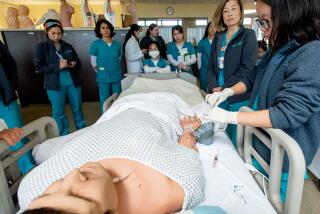College of Classical Knowledge Is a Place for New Beginnings
- Share via
For an old oilman from Oklahoma, this was heavy stuff. What is the nature of the soul? Where does it reside?
Frank King, a 60-year-old sophomore at Thomas Aquinas College near Santa Paula, knew better than to offer half-baked observations in philosophy class. So he let others speak before making a few concise remarks and then backing off.
“I think anyone with the brains to get into this place ought to come,” King said later. “Because everything after this is a piece of cake.”
Like others at the small liberal arts college, King has a degree but now hopes to get an education.
Each year, students with diplomas from such places as Stanford and UC Berkeley enroll in the Great Books curriculum taught here. At least 27% of all incoming freshmen have some level of college education, and 5% already have bachelor’s or master’s degrees.
Unlike many who return to college, they say they aren’t looking to boost their earning potential or launch a new career. In fact, they are looking at the loss of four years of full-time wages, in exchange for yet another undergraduate degree.
But they want a classical education, starting from ancient Greece, advancing through the Renaissance and ending somewhere in the 20th century with Hemingway and Huckleberry Finn.
“They want to form their minds and form good intellectual habits,” said Thomas Dillon, president of the college, which has 277 students. “They are looking for the beginnings of wisdom.”
King first saw the campus two years ago when he brought his daughter from Edmond, Okla., to visit five Southern California colleges. His daughter decided against all of them, but her dad was smitten by Thomas Aquinas.
The college sits in an isolated, emerald green valley between Santa Paula and Ojai, surrounded by mountains. Santa Paula Creek burbles nearby, avocado orchards abound and the foothills are crisscrossed with hiking trails.
“I walked around here thinking, ‘Now wouldn’t this be nice?’ ” said King, an impeccably polite man with a thick Oklahoma accent who already has a bachelor’s of science degree from the University of Missouri and a master’s of science from the University of Southwestern Louisiana.
Recently divorced after a 23-year marriage, King was looking for a new direction. He was tired of appraising oil wells and wanted to test himself in a different way. So he took the SAT, gathered references and wrote an essay on why he would be a good fit for Thomas Aquinas College.
He was accepted.
King sold his home, paid the $19,000 tuition and board and moved to a small trailer on campus. His day-to-day spending money comes from stock market investments.
Now, instead of calculating how much oil can be squeezed from a well, King spends his days studying philosophy, religion, literature and mathematics.
He has endured agonizing hours at the blackboard proving ancient geometric theorems. He studies Homer, Descartes and Einstein. The education so far, he said, has made him a more critical listener and reader.
“I admire the way Euclid, Ptolemy and Apollonius went through these thinking exercises,” King said. “I don’t know how I’ll use it when I’m done, but I want to know if I can stand up to the rigors of this curriculum.”
Brian Dragoo shared King’s itch for knowledge and the urge to test himself.
The 29-year-old Thomas Aquinas senior, with a master’s degree in civil engineering from Arizona State University, was working at a Tucson engineering firm when he began feeling restless.
“I looked at what my boss was doing and I asked myself if that is what I want to do for the rest of my life--sitting in an office 80 hours a week billing customers,” he said.
Half of the college’s graduates go on to either medical school or law school, Dillon said. And, this being a Catholic institution, there are some absolutes.
“There is a skeptical attitude in universities today that says there is no right or wrong, that there is no higher truth,” Dillon said. “This is a self-defeating proposition. If there is no truth, then there is no point in teaching.”
Philosophy instructor John Nieto said most students with degrees entering the college are in their late 20s or mid-30s.
“They recognized that something necessary was missing in their understanding of the world,” he said. “What you can gain if you apply yourself here is a vision of the world that brings everything together.”
As for King, his grades are in the solid B range and he expects to move into a dorm next year. Being the oldest student on campus means he doesn’t socialize much. He sings in the choir and keeps in close contact with his grown children and new fiancee, back in Oklahoma. When he leaves, he might become a Spanish or German translator, he said.
More to Read
Sign up for Essential California
The most important California stories and recommendations in your inbox every morning.
You may occasionally receive promotional content from the Los Angeles Times.













